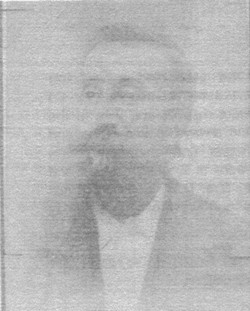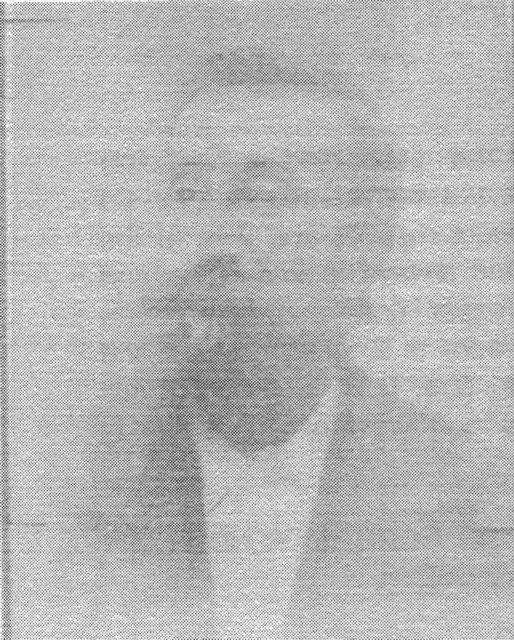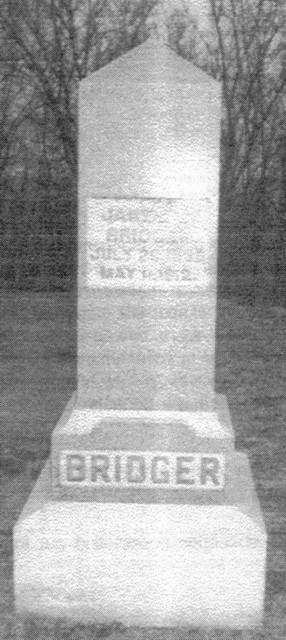It is included in Lyle D Sedwicks book: BRIDGER CEMETERY, MERCER COUNTY 1868-1998.
Reprinted here with his permission.
James C Bridger, son of Henry and Elizabeth Bridger was born on the banks of the Hudson River, Troy, New York, July 29, 1836, and died at the home of his niece, Mrs. Cora A McCreight, Saturday, May 11, 1912 at 11 o'clock p.m. He was one of a family of nine children, one dying in infancy and the remainder living to good old ages, their ages ranging from 56 to 85 years, and the father and mother passing away at the age of 75 and 82 respectively.
When Jay, as he was familiarly called, was but four weeks old the parents started for Mercer County, Illinois, a trip at that time required four months and beset with perils of every nature. Few mothers of today would contemplate a trip like this even in a palace car and we dare say none would want to attempt it and travel as they did. The father was a dairyman at Troy and his checks and receipts as well as books and letters are still in possession of the family. He sold out his interests there and started for Illinois by the canal thence across Lake Erie by steamer. A fearful storm beset them and most of their household goods were thrown overboard. At one time the Captain and crew decided to abandon the ship and the passengers all were in the life raft boats but the cabin boy who stoutly declared he would never leave the ship as long as there was a passenger aboard. Although this boy was only 11 years old he had the force of character to put to shame the strongest of the crews and finally with a mighty cheer every man returned to the ship and to his post of duty, and every soul on the vessel was saved. They landed in Detroit, Michigan and with ox team crossed Michigan to Chicago never sleeping in a house on the way. At night they would chop down and draw together two large logs and pile smaller wood between and thus keep up huge fires partly to keep wild animals away and also for warmth, as by that time it was becoming cold. Arriving at Chicago, which then contained a store, grain warehouse, blacksmith shop, tavern, and a dozen homes, they rested their teams and then pressed on westward where they arrived January 1st. The family settled in the timber and later moved out and built the log house at Suez in 1840. A portion of this still stands and the same land was in possession of Mr Bridger at the time of his death. Here he grew to manhood and experienced all the perils and trial incident to pioneer life. A copy or memorandum of the number of bushels of their wheat crop thrashed each day in 1837 is still with their papers and showed from 10 to 54 bushels per day, according to the number at work. They still have at the old place many of the old implements used at that day. At one time Mr. Bridger was offered 160 acres of land if he would pay the taxes on 640 acres, but having no cash he could not accept the offer. It's said at that date it was difficult to find a man in Mercer County who had ? in cash. Nearly all transactions were carried on with produce.
Mr Bridger obtained the education that the country of that date would perrmit. In politics he was a Republican and cast his first vote with the organization of the party. When the Civil War broke out he was heart and soul in the cause, but owing to accidental deformities was not eligble to enter the ranks but did all he could as one of the quiet workers at home and was the last survivor who assisted in hauling the 102nd Illinois Regiment to Knoxville when it entered the service.
He was a farmer and stock raiser, an energetic and active man, and strictly honest and reliable and as he passed to this long rest it was with perfect assurance that none could speak ill of him and he had not an enemy in the world.
The family, in order of their ages were William H, Mary, Julia, Henry T, Mrs. Dan W Sedwick, Philip T, of Mendon, Missouri, and Mrs Anna E Page. Only one brother, Philip survived him.
The funeral services were held at the residence of W.S. McCreight on Tuesday at 10 o'clock a.m. and the remains were laid to rest in the Bridger Cemetery. Thus ends a long, active, and useful life.
It is included in Lyle D Sedwicks book: BRIDGER CEMETERY, MERCER COUNTY 1868-1998.
Reprinted here with his permission.
James C Bridger, son of Henry and Elizabeth Bridger was born on the banks of the Hudson River, Troy, New York, July 29, 1836, and died at the home of his niece, Mrs. Cora A McCreight, Saturday, May 11, 1912 at 11 o'clock p.m. He was one of a family of nine children, one dying in infancy and the remainder living to good old ages, their ages ranging from 56 to 85 years, and the father and mother passing away at the age of 75 and 82 respectively.
When Jay, as he was familiarly called, was but four weeks old the parents started for Mercer County, Illinois, a trip at that time required four months and beset with perils of every nature. Few mothers of today would contemplate a trip like this even in a palace car and we dare say none would want to attempt it and travel as they did. The father was a dairyman at Troy and his checks and receipts as well as books and letters are still in possession of the family. He sold out his interests there and started for Illinois by the canal thence across Lake Erie by steamer. A fearful storm beset them and most of their household goods were thrown overboard. At one time the Captain and crew decided to abandon the ship and the passengers all were in the life raft boats but the cabin boy who stoutly declared he would never leave the ship as long as there was a passenger aboard. Although this boy was only 11 years old he had the force of character to put to shame the strongest of the crews and finally with a mighty cheer every man returned to the ship and to his post of duty, and every soul on the vessel was saved. They landed in Detroit, Michigan and with ox team crossed Michigan to Chicago never sleeping in a house on the way. At night they would chop down and draw together two large logs and pile smaller wood between and thus keep up huge fires partly to keep wild animals away and also for warmth, as by that time it was becoming cold. Arriving at Chicago, which then contained a store, grain warehouse, blacksmith shop, tavern, and a dozen homes, they rested their teams and then pressed on westward where they arrived January 1st. The family settled in the timber and later moved out and built the log house at Suez in 1840. A portion of this still stands and the same land was in possession of Mr Bridger at the time of his death. Here he grew to manhood and experienced all the perils and trial incident to pioneer life. A copy or memorandum of the number of bushels of their wheat crop thrashed each day in 1837 is still with their papers and showed from 10 to 54 bushels per day, according to the number at work. They still have at the old place many of the old implements used at that day. At one time Mr. Bridger was offered 160 acres of land if he would pay the taxes on 640 acres, but having no cash he could not accept the offer. It's said at that date it was difficult to find a man in Mercer County who had ? in cash. Nearly all transactions were carried on with produce.
Mr Bridger obtained the education that the country of that date would perrmit. In politics he was a Republican and cast his first vote with the organization of the party. When the Civil War broke out he was heart and soul in the cause, but owing to accidental deformities was not eligble to enter the ranks but did all he could as one of the quiet workers at home and was the last survivor who assisted in hauling the 102nd Illinois Regiment to Knoxville when it entered the service.
He was a farmer and stock raiser, an energetic and active man, and strictly honest and reliable and as he passed to this long rest it was with perfect assurance that none could speak ill of him and he had not an enemy in the world.
The family, in order of their ages were William H, Mary, Julia, Henry T, Mrs. Dan W Sedwick, Philip T, of Mendon, Missouri, and Mrs Anna E Page. Only one brother, Philip survived him.
The funeral services were held at the residence of W.S. McCreight on Tuesday at 10 o'clock a.m. and the remains were laid to rest in the Bridger Cemetery. Thus ends a long, active, and useful life.
Family Members
Sponsored by Ancestry
Advertisement
Explore more
Sponsored by Ancestry
Advertisement












